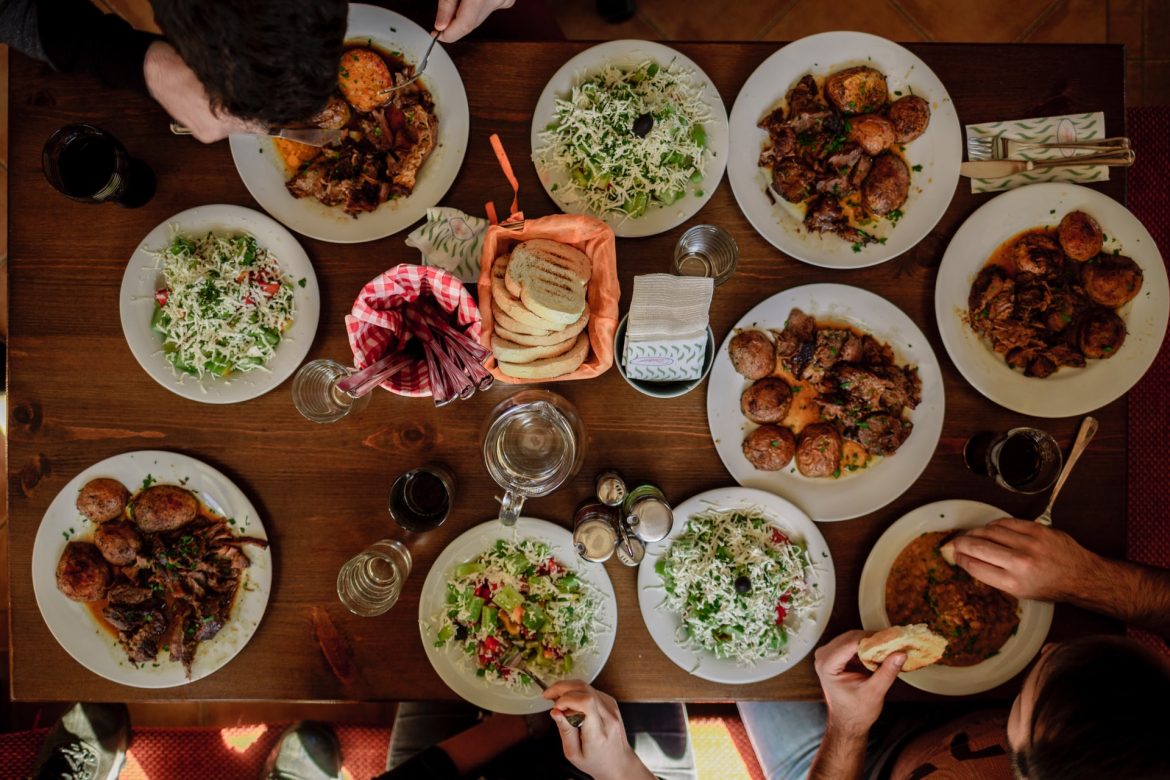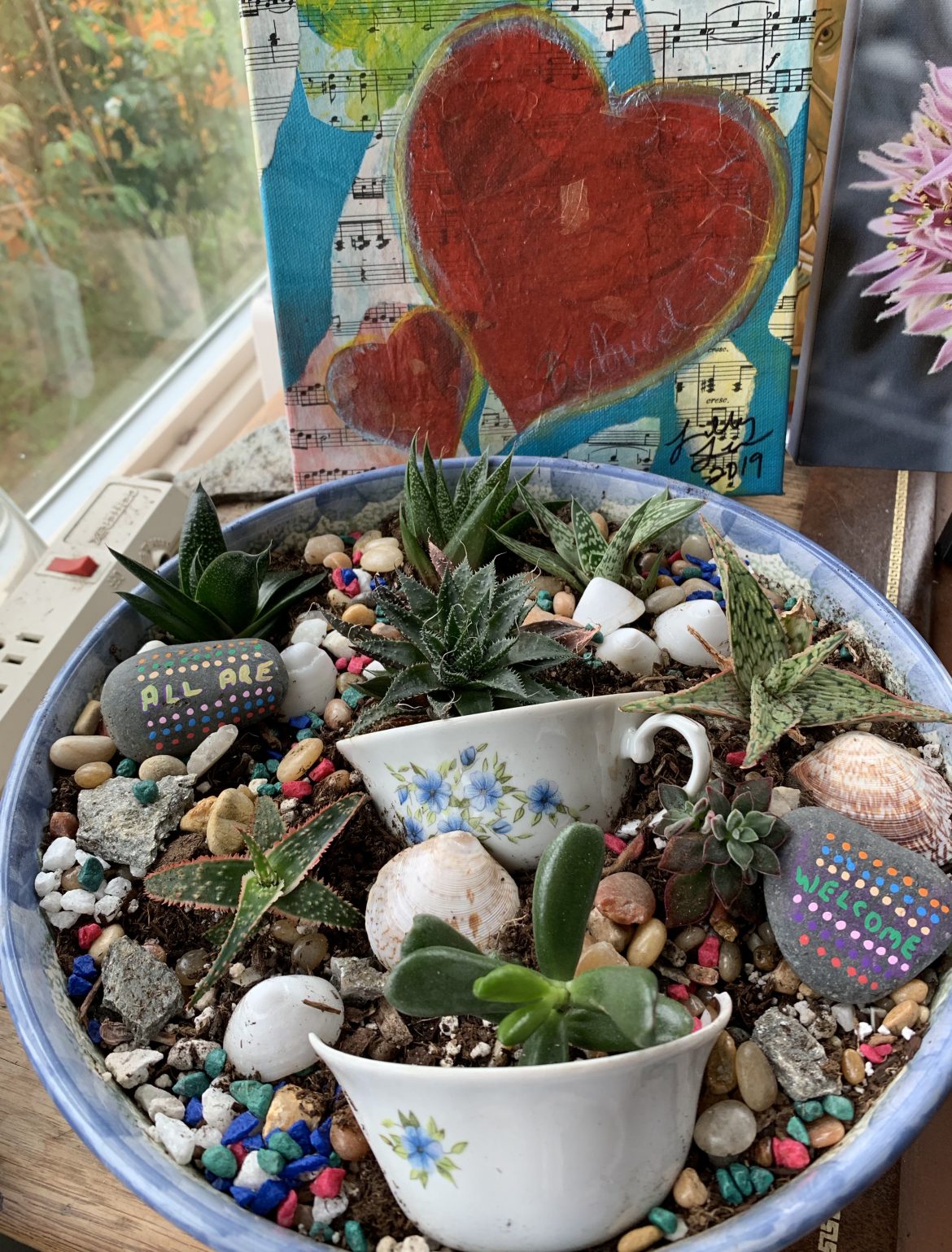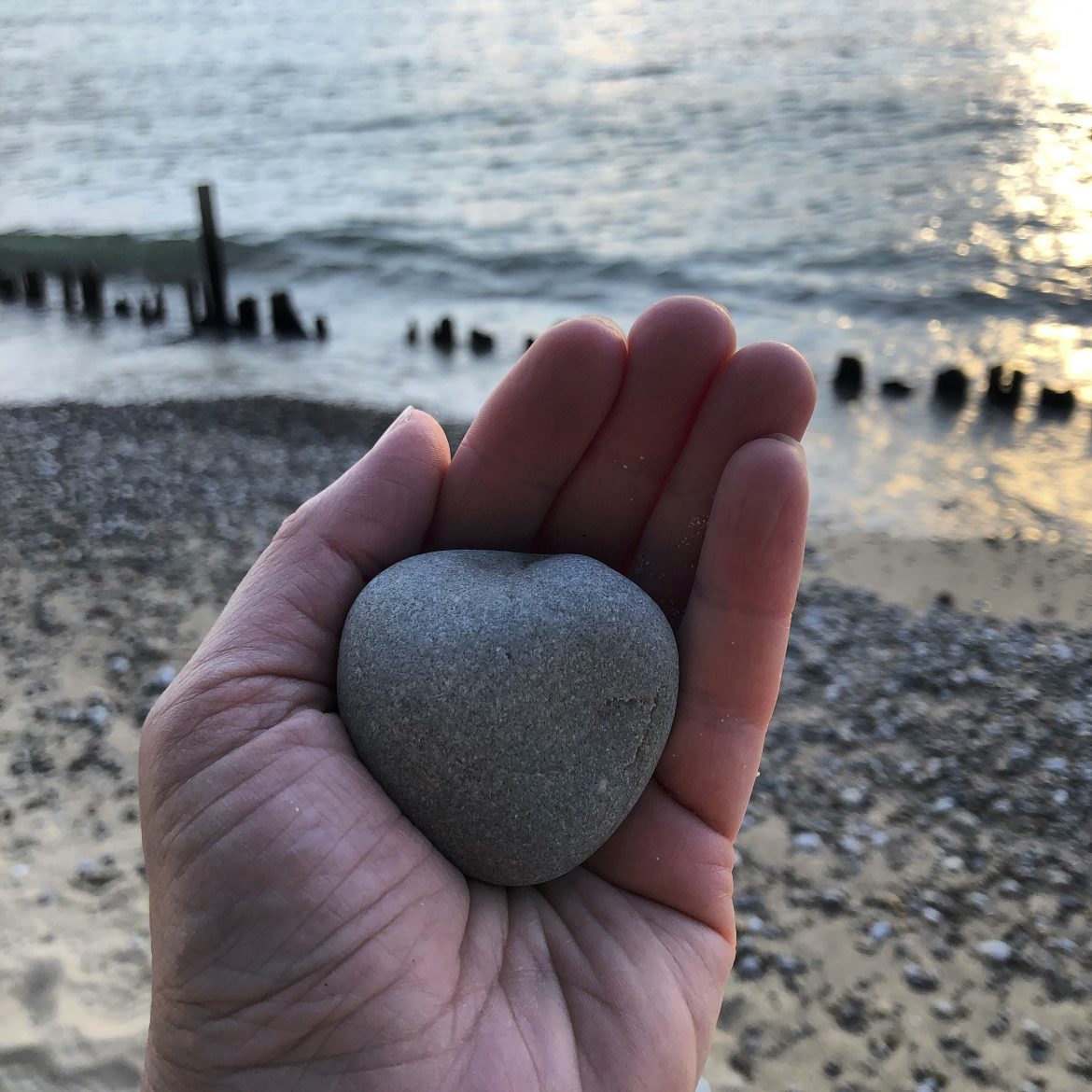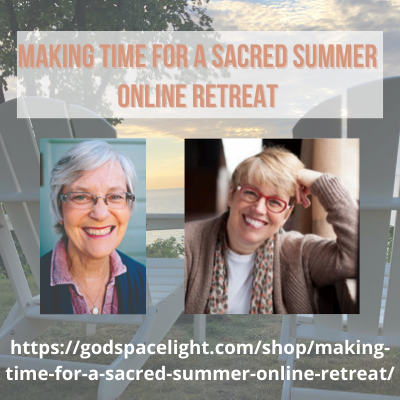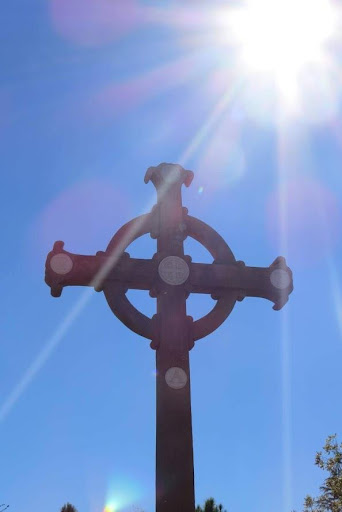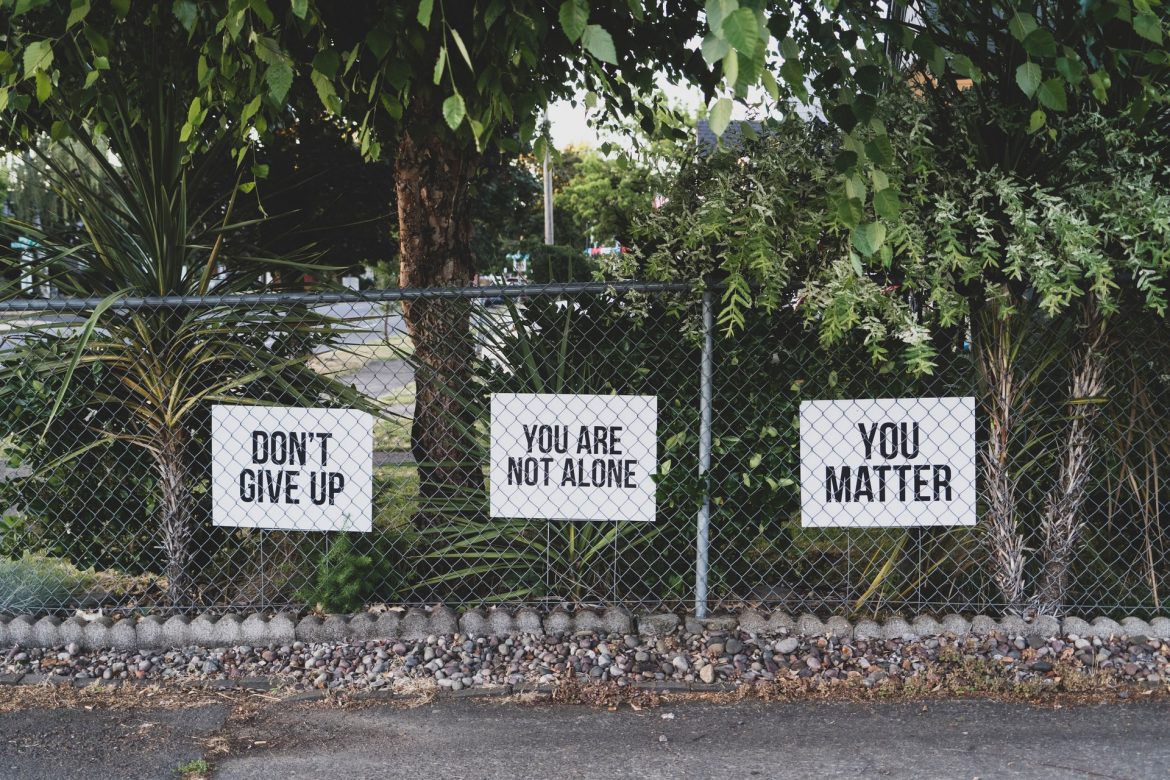Editor’s Note: We are pleased to present this guest post by Kendall Vanderslice from Edible Theology. Kendall is the author of We Will Feast: Rethinking Dinner, Worship, and the Community of God. You can find more about Kendall here.
I sipped my glass of wine under a string of lights on an outdoor patio with friends last week. The table was spread with roasted lamb, arugula salad, and an elaborate cheese board. It was the first time this group had been together in two years, since cross-country moves had separated us all. And yet between the laughter and the storytelling, it felt as though no time had passed. We had much to celebrate: birthdays, a baby, multiple ordinations. Our friendship had been built together around the table through a regular meal share in seminary—we each took a night of the week to cook for the crowd, allowing us rest from cooking the other nights and ensuring a break from our studies to eat with friends. So formative were these rhythms to our friendship, it only felt natural to slip right back in.
Almost everyone can share of a similar event, a meal that made them feel grounded, loved, known—I imagine you’re conjuring up the memory of one right now. You feel your shoulders and jaw relax as you remember what it felt like to belong. Your stomach growls as the faint scent of the food hits your nose.
I also imagine you can just as easily think of a meal where you felt out of place. Perhaps a tense family thanksgiving or an awkward coffee hour at church. You feel yourself gripping your mug of coffee a bit tighter, just as you did that day.
Our senses have a powerful ability to hold onto memories. Oftentimes we view sight and sound as superior in the hierarchy of senses, treating taste, touch, and smell as less reliable, less important, more basic. But these basic senses, especially taste and smell, are actually spectacular at helping us locate memories. The location in the brain that processes smell sends information immediately to the limbic system, which processes memory and emotion. It’s why a smell can transport you back to a place or an event, and why you can so easily conjure up the taste and smell of the meal you just brought to mind.
This close connection between memory, taste, and smell, is the reason meals can be powerful places of storytelling and remembering, as well as a meaningful platform for social bonding—a fancy way of saying they help us forge relationships.
It’s also, I believe, why so many stories in Scripture are told through meals: the meal of forbidden fruit that brought death into the world in Genesis 3, to the meal of bread and wine that marks a death which brought the world back to life. Meals of miraculous provision, from manna in the desert to loaves and fish for an audience of 5,000. Meals that mark God’s presence, from the showbread held in the ark of the covenant to the bread broken on the path to Emmaus.
And it’s why Jesus offered a meal to us as the cornerstone of Christian worship—a bite of bread and a sip of wine to tell the story of Christ’s death and resurrection, to sustain us as we wait for the full redemption of all things, to teach us to hunger for the meal to come: what Revelation describes as a marriage supper of the Lamb.
As a food scholar who studies the social dynamics of eating together, as well as a student of theology, I’m fascinated by the ways that meals can shape our understanding of God, of community, of worship, and more. And I’m convinced that around the table, as we probe our relationships to food, eating, and the table, we can find healing in relationship to our own bodies and the Body of Christ as well.
Enter: Worship at the Table, a six-lesson curriculum for churches, Sunday schools, small groups, and groups of friends that traces the story of God, as well as our own stories, through meals.
Developed out of my research in the fields of both food studies and theology, in collaboration with expert curriculum builders, I believe this program is just what is needed as we grapple with the impact of Covid isolation on our communities. Each week, a group gathers together around the table—an elaborate spread of lamb and salad, or simply a box of doughnuts and steaming mug of coffee—to study the meals contained in Scripture, to probe their own relationships to food and the table, and to imagine together how to use the table as a place for spiritual formation and for healing.
Worship at the Table is built on a fundamental tenet of Christian practice: the table set with bread and wine — a simple setting that tells the most profound story of all time. The story of Christ’s broken body and our fragmented humanity, of God’s presence, provision, and promise to heal.
By the end of this program, participants will understand the role of meals in the story of Scripture, be able to reflect on the positive and negative aspects of their relationship to food, be aware of their gifts and limitations in hosting meals for others, and have a plan for building community in their own homes and church.
I hope that, through it, you and your friends, family, community, or congregation will sense more deeply God’s healing presence and ongoing provision in your own lives too.
Learn more about Worship at the Table, which we will pilot in 25 churches this fall, by visiting www.edibletheology.com/worship-at-the-table
Photo by Stefan Vladimirov on Unsplash As an Amazon Associate I receive a small amount for purchases made through appropriate links. Thank you for supporting Godspace in this way.
 Tomorrow – Next Facebook Live!
Tomorrow – Next Facebook Live!
Join Christine Sine and Lilly Lewin for a lively discussion on hospitality – happening TOMORROW! Wednesday, July 6th at 9 am PT. Happening live in the Godspace Light Community Group on Facebook – but if you can’t catch the live discussion, you can catch up later on YouTube!
Have you ever had a dream that you thought could change the world? Well, maybe not the whole world but at least a significant part of it. John Flynn, known in Australia as Flynn of the Inland was one such man. He died not long after I was born, but stories of his accomplishments in establishing what is now the Royal Australian Doctor Service, the first air ambulance in the world, were the backdrop of my childhood and never ceased to inspire me. His face appears on the back of the Australian $20 which gives an idea of how influential he was in the forming of our country.
The Royal Australian Doctor Service was not the only one of his accomplishments however. He was ordained as a Presbyterian minister in 1911 and wandered the outback alone on camelback, covering thousands of dry thirsty miles through the harsh Australian Centre, dreaming dreams for his beloved Red Centre. His parish was one of the largest in the world. He visited isolated stations (ranches) all over Central Australia, his heart aching for the isolated and lonely people who dotted the land. He dreamed of a “Mantle of Safety” a medical care and communication system available to all these isolated communities but the technology to make most of this possible did not exist at that time. He did not give up however. He continued to dream, even when those around him thought he was crazy. He persevered, inspired a small group of fellow dreamers and slowly started to see change come.
First there were the bush hospitals with one or two nurses reaching out to the even more isolated communities they served with whatever transport they could find. Sometimes wading through floods to get to them. They were often the first women in the community and brought change not just because of their medical skills but because they often transformed the men by their presence.
Ironically it was WWI that made the next part of the dream a reality. The small aircrafts used during that war made flying doctor services possible, though it was not until 1928 that the first base was established.
The hardest dream to fulfill was a wireless network to help connect the isolated communities. Flynn’s dream inspired Alfred Traeger to experiment time and time again until finally a small inexpensive wireless transmitting set. The generator that supplied the power for the transmitter was operated by foot, like a bicycle, and could generate about 20 watts of power. It was simple enough to be easily mastered by isolated bush mothers and fathers who could finally communicate rapidly with the outside world.
John Flynn accomplished his titanic task and fulfilled his dreams, ringing the entire northern half of the Australian continent with his “Mantle of Safety”: the Bush Hospitals, the Flying Doctor Service, the longed-for transport and communication, that have saved and continue to save many valuable lives and banished the deadening isolation of lonely men and women.
He believed that no God-given dream was impossible. Perseverance, hard work, and a group of creative collaborators could indeed change the world even if you had to wait years for the appropriate technology to be invented to accomplish it.
I first read about this incredible man in Ion Idriess’s book Flynn of the Inland and the impact of his story remained with me throughout my life. He laid the seeds for my desire to not only become a doctor but to also be able to change the lives of those who had no access to medical care. He was a man who truly lived like Christ lived, and encouraged others to do the same without ever preach at them.
Who are the amazing people from your past who helped set the trajectory of your life because of their dedication and perseverance? Make a list and offer up a prayer to God.
 Digging Deeper: The Art of Contemplative Gardening
Digging Deeper: The Art of Contemplative Gardening
Christine Sine’s latest book is packed full of contemplative wisdom and inspiration for creating your own meditative focus. Whether a beginner or an expert gardener, enjoy the process alongside Christine! Click for more details!
Editor’s Note: The following post was originally posted here as a Meditation Monday. The following Quinoa Stir Fry recipe is from the post Cooking With Quinoa.
Henri Nouwen calls hospitality “the creation of a free and friendly space where we can reach out to strangers and invite them to become our friends…. He goes on to suggest that the most important guests, the most important strangers we get to entertain in our homes are our children. When they are born, we don’t really understand who they are or who they will become. “They are guests we need to respond to, not possessions we are responsible for.”… Maybe hospitality is about receiving every stranger in the same way we receive a child. (The Gift of Wonder 187)
I have just set up a new contemplative garden on my desk – a hospitality garden that’ll be the focus of my morning prayer time for the next few weeks. You could say that this garden was created by happenstance or more likely the prompting of the Holy Spirit.
All are welcome
Last week someone gave me a collection of cups to make into succulent gardens. Our dog Goldie immediately grabbed one and broke it, so I decided to make it the focus of my garden. Then I took an assortment of succulents that needed homes and planted them around and in the cup. Next I painted my rocks with the words “all are welcome” and decorated them with dotted patterns.
To prime the pump for my reflections I reread the chapter in The Gift of Wonder entitled Come to the Table, which the quote above comes from. My eyes were riveted. On Wednesday my nephew Matt and his wife Kass arrived from Australia with their 6-month-old baby Lucy to visit. We have done everything possible to welcome this baby, this stranger whom we hope will become a friend. We have cleared out our guest room to create space for her. We have rearranged our schedules to make time for her and now we want to spend time with her, accepting her as she is now, not trying to change her into who we want her to become but seeking to identify and encourage her to develop the gifts God has placed within her.
The Gift of Radical Hospitality
We forget sometimes that Jesus too came as a baby and as a stranger into the midst of his family and community. And he was an unwanted baby to many, born to an unwed mother, outside the bonds of convention and acceptability. Yet he was welcomed by his mother Mary with great excitement and delight. And he was welcomed by Joseph as a part of his family too. They seem to have extended generous hospitality to him, made room in both their hearts and their home for him.
Then while he was still an infant, he becomes the welcomer to those who are most despised in his community – to the shepherds and the gentile magi. Once again Mary and Joseph and probably his extended family, make room for the strangers that come to meet this baby. What an incredible model of hospitality we see even here in the birth of this child.
What if we read life with the belief that all are welcome at God’s table? What would it look like if I was willing to welcome every stranger as I welcome this child?
It did not occur to me until I was finished creating my garden that this is gay pride month and more than anything people in this movement long to hear the words of hospitality “all are welcome at my table.” They want to know that though they may be strangers we are willing to sit down and invite them to become friends, we are willing to embrace and listen to them rather than criticize and reject them.
It is the same for refugees and immigrants, for the homeless and those of different races and creeds, so many of whom have also travelled long distances in the hope of welcome. There are so many who are strangers in our midst that are waiting for us to sit down and invite them to become friends, just as we have invited little Lucy and her parents into our home and invited her to become a friend.
How did you respond to the last newborn infant you were introduced too? What feelings and emotions welled up within you? …. What changes in behavior were you willing to make in order to get to understand this child, accommodate its needs, help it feel welcome in your home?
Now think about the last time you met a stranger – perhaps a homeless person on the street or a new member at your church. How did you welcome them as you would welcome a child? In what ways did you endeavor to turn this stranger into a friend? The Gift of Wonder 189
One of the hallmarks of Jesus’ life was radical hospitality. He repeatedly invited outcasts, and the despised, Gentiles and Jews alike to eat together at his table. His guiding precept is “God is love and I will extend that love to everyone who comes.”
A New Testament theologian once told me that he believed Galatians 3:28 There is neither Jew nor Gentile, neither slave nor free, nor is there male and female, for you are all one in Christ Jesus was one of the creedal statements of the early church.
What if that is true? What if we all are one in Christ in spite of our differences?
Yesterday I came across this beautiful poem by Native American poet laureate Joy Harjo. It is a great one to read as we reflect on our differences and the place that hospitality can play in helping us to see the world and those who inhabit it differently.
Perhaps the World Ends Here:
The world begins at the kitchen table. No matter what, we must eat to live.
The gifts of the earth are brought and prepared, set on the table. So it has been since creation, and will go on. (Read entire poem here)
I think that is what the banquet table of the kingdom is all about. It is a place of radical hospitality to which all are invited and at which all are welcome. It is a place where all can sit down and talk about their differences, not with judgement but with love. Not seeking to convert others to their viewpoint, but seeking for understanding and acceptance of those who think differently. What do you think?
~ ~ ~
INGREDIENTS:
– 4 cups cooked quinoa
– 1 stalks celery
– 1 sweet bell pepper, chopped in small pieces
– 1/2 cup cooked chickpeas
– 1 large onion, chopped in small pieces
– 1 cup mushrooms, chopped
– 1 green zucchini , sliced
– 1 yellow zucchini , sliced
– 2 cups swiss chard or spinach, chopped
– 1/2 cup dried tomatoes
– 3 cloves garlic, minced
– 1 tablespoon olive oil
– 1 tablespoon fresh ginger, minced
– 1/2 teaspoon brown mustard seeds
– 1 bay leaf
– 1/2 teaspoon tumeric
– 1/2 teaspoon ground coriander
– 1/2 teaspoon cumin
– 1/2 teaspoon fresh thyme
– 1/2 teaspoon salt
METHOD:
1. Heat olive oil on medium low in a 3 – 4 qt saucepan or sauté pan. Saute onions until translucent add garlic & ginger, sauté with mustard seeds for 5 minutes
2. Chop celery, zucchini, mushrooms and red pepper, add to pan and sauté another five minutes.
3. Mix in the bay leaf, turmeric, coriander &; cumin
4. Add the quinoa and stir until mixed.
5. Stir in the optional greens, and fresh ground pepper
6. Cover and cook 5 more minutes, then serve – or refrigerate and serve chilled as a salad.
 Next Facebook Live!
Next Facebook Live!
Join Christine Sine and Lilly Lewin for a lively discussion on hospitality – happening next Wednesday, July 6th at 9 am PT. Happening live in the Godspace Light Community Group on Facebook – but if you can’t catch the live discussion, you can catch up later on YouTube!
We get to begin a new month today! I’m excited! I need a fresh start! June has been long and felt hard for many reasons. Heavy things…friends hurting, wars raging, freedoms lost.
We are still recovering from two long years…. we cannot keep pouring from an empty cup! We need rest and recovery!
So here are some ideas from The Gift of a Sacred Summer that you can practice on your own, as a family, with your housemates or small group friends.
PRACTICES
Each day of the week, take time to do the 5 or the 15-minute practice. Plan a time to do the Going Deeper practice sometime during the week.
- 5-minute Practice: Sit down somewhere peaceful and comfortable or pick a quiet spot to lay down and just rest for 5 whole minutes. Set your timer to help you with this practice. What do you notice? Picture Jesus putting a blanket of peace and love around your shoulders. Each day this week, practice 5 minutes of resting.
- 15-minute Practice: Plan ahead and consider what helps you rest and relax and connect with yourself and Jesus. Read a book that isn’t for work or school, go outside and take a 15-minute walk, get out the crayons and color for fun (only if this brings joy). Or just sit down in your Sabbath Spot and be with Jesus. Notice if you get anxious or nervous because you aren’t accomplishing anything. Give these feelings to Jesus to keep for you, or write them down and put them in your Sabbath Box for Jesus to hold.
- Create a Sabbath Box: Select a big enough container to hold items like your cell phone, laptop, or game controller. This box is designated to create space to store away items that might distract you as you choose to disconnect from the world and connect with God. You can purchase a box, decorate an old box, or use a basket with a lid.
- Going Deeper: Set up a Sabbath/Rest Day. We all need community to help us practice real rest because we forget to do it on our own and if we live with other people, it helps them to be on board too. If you are going to set up a sabbath rest time or an afternoon or a 24-hour sabbath day practice, you need to talk about this with a friend, family, housemates, small group, etc., so you can have the space to practice rest either on your own, or better yet, as a group. When could you have an evening or an afternoon that is all about rest? Put it on the calendar and actually open the gift of rest together.
What would you feel like at the end of the month if you took time to really rest and restore your soul? What would it take for you to truly experience the unforced rhythms of Grace? Are you willing to love yourself and open the Gift of Rest?
“Are you tired? Worn out? Burned out on religion? Come to me. Get away with me and you’ll recover your life. I’ll show you how to take a real rest. Walk with me and work with me—watch how I do it. Learn the unforced rhythms of grace. I won’t lay anything heavy or ill-fitting on you. Keep company with me and you’ll learn to live freely and lightly. Jesus Matthew 11: 28-30
Lord Give us grace today to love as you love
Help us to love with extravagance.
Give us hope today for ourselves and others. Heal our hurts and our hearts today
So we can serve and help those around us. Help us to know that you are enough.
And help us live today and everyday in thankfulness.
For all you’ve done and for all your blessings. In the Name of the Father, The Son and the Holy Spirit. AMEN
You can order The Gift of A Sacred Summer Kit for individuals and for small groups and large churches

Gift of a Sacred Summer Kit
©lillylewin and freerangeworship.com
Available as an online course, sign up here to gain 180 days of access while you work through this retreat at your own pace. Join Lilly Lewin and Christine Sine in the awe of the broad array of summer symbols that can gain spiritual significance for us when we stop and think about them. Everything from beachcombing to putting on suntan lotion can be the inspiration for practices that draw us closer to God.
Ground yourself in the earth and its summer season where you live and find the ways that God is speaking through it – all the details can be found here!
by Melissa Taft
In the Beginning, there was a Name.
In the beginning was the Word, and the Word was with God, and the Word was God. John 1:1 NIV
In the beginning the Word already existed.
The Word was with God,
and the Word was God. – John 1:1 NLT
When God spoke the world into being, He began with a name. He began with one who was named; the Word. He spoke light into being by naming it Light. He named light and the absence of it Day and Night. And from these delineations, from these names, powerful things followed. When you hear the word ‘light’ or the word ‘darkness’, you have a definition in your head of what those things are. But even more than that, you have associations with those words. You have nuances that are unique to you and your experience; of your own concept of light and darkness. And when you name a thing light or dark, it carries meaning beyond the dictionary definition. It carries weight and destiny.
I’ve been thinking lately about the power of names, and the importance of using names properly as a way to live justly. Indeed, there are campaigns to bring a more just narrative around shootings or violence – centering the victims rather than the sensationalism of the shooter. It begins with centering the victim(s) by name. The important name(s) should be those who were wronged, not those who perpetrated the wrong. Speaking the name of the victim humanizes them and centers our efforts properly. I was thoroughly inspired by Christine Sine’s recent Meditation Monday the Value of Naming, where she talks about the power of perspective that names imbue. She also talks about the inherent justice of calling things their proper names:
I wonder if one of the challenges we should all give ourselves in this post-COVID season is to continue to get to know our neighbourhoods and our country in this way and not just learn it by the names that places have now, but by the names that it used to be known by. I love that Uluru, the huge rock at the centre of Australia, was returned to the name given it by the aboriginal peoples after 100 years of being called Ayers Rock. In so doing not only did the rock gain value as the spiritual centre the aboriginals saw it to be, but also as an important distinctive landmark for all Australians.
The justice and meaning of returning a name to its proper place or calling someone by their proper name has really resonated with me in the season I’m in. I recall a Sunday school session once when I was a teen. Abraham came up I believe – one whose name had been changed to reflect his destiny – and I remember at the time being obsessed with baby names. I really wanted to be a mother, and it was a calling I took very seriously. It seemed tremendously important to get the names right. So I raised my hand and asked our wise teachers what they thought about names and their meanings – if indeed they carried weight and destiny. I don’t remember the discussion much beyond a general consensus of ‘probably yes’, and that it was lively and deep and interesting. I do remember that as the clock let us know it was time to disperse to the main service and we were standing up to leave I was asked, “by the way, what does Melissa mean?” to which I paused, then sheepishly replied “honey bee.” We did all get a good laugh.
I suppose it isn’t an accident that name meanings long interested me. My middle name is the third passing down from mother to daughter. My paternal Grandmother lined the wall of her basement steps with the portraits of her grandchildren, and underneath a name plaque that defined each name with a corresponding prayer and verse. My father is not a junior, but the 3rd. And I grew up reading about and listening to the significant stories in the Bible where names meant something to the story and destiny of those so named.
And I chose my own children’s names with care and prayer. They mean something to me. I wished for them a good destiny, and wove it into their very names, as if speaking it aloud every time they were called would make it so. And yet, both of my children have grown from these names into names of their own choosing, for various reasons. It surprised me how immediately I embraced my younger child’s new name, but the truth is names are as personal as they are powerful, and I saw the anxiety give way when the chosen new name was spoken. I also saw how true it was to their sense of self.
A friend coming out of an abusive marriage, and another out of an abusive family, also chose new names. It was part of their healing to identify themselves in a truer manner. And too, several friends and family I have known have changed their names to better reflect their gender identity. Another example is how recently, rather than coming up with an ‘English’ name, more and more people are claiming or reclaiming their proper non-English name and using that name in their place of business. If you can learn to pronounce Melissa, you can learn to pronounce your coworker’s name.
I have seen firsthand how kind and just it is to call people by their chosen or affirmed names, and the damage done by calling them by their old or rejected names. As we call places and animals and plants and whatever else by their proper name to convey a sense of place or throw off a sense of colonizing – bringing relief and justice – so too does calling a person by their sense of self. Names have power – we believe in the power of Jesus’ name, so too should we realize that the simple act of accepting someone or something’s proper name brings restoration, hope, relief, and justice.
After all, when we speak a name, it is not for our personal edification. I do not call the mountain in my state Tahoma because I like the sound of it better. It is Tahoma because that is what it IS, and even if its current official name is Rainier, it is not my destiny I am calling to but that of the people who called it Tahoma in the first place. So I honor that choice, and I honor the mountain, and I honor the people, by speaking the right name.
Photo by Jon Tyson on Unsplash
 We all need the Wholeness of God…this resource includes reflections and activities for coping and thriving during the COVID-19 challenges in search of shalom as well as hope for restoration during and after this period of social distancing.
We all need the Wholeness of God…this resource includes reflections and activities for coping and thriving during the COVID-19 challenges in search of shalom as well as hope for restoration during and after this period of social distancing.
photos and writings by June Friesen, all scripture given in The Message translation
This day is set to commemorate the deaths of two of the first apostles of the Christian church. Even though Paul was not one of the original disciples, after his dramatic conversion he was called an apostle.
As I was considering the lives of both the Apostle Peter and the Apostle Paul, I realize that they are two men who contributed greatly to the spread of the Christian church in the world as it was known in their time. They were both in many respects disliked greatly by the Roman government and leaders as well as the people of Israel, especially the religious leaders of the Jewish people. Today I would like to reflect on a few verses first from Peter and then from Paul to encourage each one of us in our remembering of them, to also take up the challenge they gave: to stand true to Jesus and live totally for His cause.
Peter, who was with the group of people awaiting the descent of the Holy Spirit, was empowered with great wisdom as well as a very bold spirit and he took no time to begin to address the people after the Holy Spirit descended and empowered Jesus’ followers. Here in Acts 3 he calls for the people to come and believe, follow the ways of Jesus and find rest and peace for your spirits.
Acts 3: 19-26 (The Message)
19-23 “Now it’s time to change your ways! Turn to face God so he can wipe away your sins, pour out showers of blessing to refresh you, and send you the Messiah he prepared for you, namely, Jesus. For the time being he must remain out of sight in heaven until everything is restored to order again just the way God, through the preaching of his holy prophets of old, said it would be. Moses, for instance, said, ‘Your God will raise up for you a prophet just like me from your family. Listen to every word he speaks to you. Every last living soul who refuses to listen to that prophet will be wiped out from the people.’ 24-26 “All the prophets from Samuel on down said the same thing, said most emphatically that these days would come. These prophets, along with the covenant God made with your ancestors, are your family tree. God’s covenant-word to Abraham provides the text: ‘By your offspring all the families of the earth will be blessed.’ But you are first in line: God, having raised up his Son, sent him to bless you as you turn, one by one, from your evil ways.”
When I consider Peter and Paul particularly, I picture a couple of rather rough-and-scruff-looking men. I definitely do not picture them as three-piece suit and tie kind of people calling others to come to the synagogue/Temple to hear a sermon about the Messiah. No, rather they go to where the people are or where they know the people will come and gather to listen to them. Both Peter and Paul were well versed in the scriptures that were then available as they would have heard them expounded in the Synagogue/Temple. We also know that the scribes and Pharisees followed Jesus around listening to Him and His teaching. They did this it tells us so that they could try and catch Him teaching false things about the Law and Old Testament Scriptures. In this passage Peter is pleading with the people to consider, to think seriously about all of the recent events in their community. Can you not understand even a little bit what Jesus tried to tell you? Will you not open yourselves now to His Spirit and come believe in Him as ‘your Messiah’ today? Before I go further let me share a few verses from Paul that I also really like.
In Acts 9 we have the account of Saul meeting God/Jesus as he was on his way to the city of Damascus to wreak havoc on the Christians there. Many if not all of us know this story readily of God’s blinding visitation on the road as Paul was traveling on his way to lead a persecution of Christians in Damascus. I choose some verses immediately after Saul’s change of heart as well as a couple of verses from Philippians that are favorites of mine from childhood.
19-21 Saul spent a few days getting acquainted with the Damascus disciples, but then went right to work, wasting no time, preaching in the meeting places that this Jesus was the Son of God. They were caught off guard by this and, not at all sure they could trust him, they kept saying, “Isn’t this the man who wreaked havoc in Jerusalem among the believers? And didn’t he come here to do the same thing—arrest us and drag us off to jail in Jerusalem for sentencing by the high priests?” 22 But their suspicions didn’t slow Saul down for even a minute. His momentum was up now and he plowed straight into the opposition, disarming the Damascus Jews and trying to show them that this Jesus was the Messiah.
14-16 Do everything readily and cheerfully—no bickering, no second-guessing allowed! Go out into the world uncorrupted, a breath of fresh air in this squalid and polluted society. Provide people with a glimpse of good living and of the living God. Carry the light-giving Message into the night so I’ll have good cause to be proud of you on the day that Christ returns. You’ll be living proof that I didn’t go to all this work for nothing. 17 Even if I am executed here and now, I’ll rejoice in being an element in the offering of your faith that you make on Christ’s altar, a part of your rejoicing.


Saul, who from here on I will refer to as Paul had an incredible change of heart as well as attitude. Another thing that I gain from Paul is that his enthusiasm and determination to spread the truth about Jesus was equally as strong in face of the opposition that he now faced from the Jewish persecutors where he had once been the leader.
So how may you and I celebrate/commemorate the lives of Peter and Paul today in 2022? How can we show respect for them and all that they did for the Christian faith that we now embrace? You may have already noticed that I have chosen photos of crosses to be a part of today’s thoughts. It is because history holds that both Peter and Paul met their deaths at the hands of the Romans by crucifixion. Peter, who did not want to be crucified like Jesus, His Lord, asked to be crucified upside down.
I believe that as we choose to remember these two apostles and how much each one of us have benefitted by the lives they lived as well as the recorded letters that they shared with the early Christians we can find strength and courage to face struggles in our lives today. So often I have heard people say that when one chooses to become a follower of Jesus their lives will be so much better as they will have assurance of living in heaven after their earthly death. However, when I look at the followers of Jesus in the New Testament their lives were anything but easy. They were filled with struggles, persecutions, false accusations, prison time and martyrdom. Yet over and over these men stood strong and said that they were only preaching the truth from God/Jesus through the Holy Spirit. So, as we take time to reflect on the lives of Saint Peter and Saint Paul let us be encouraged as well as challenged by their examples to also stand strong in our faith walk with God.
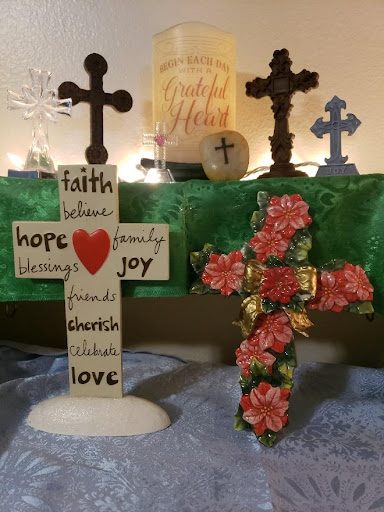
Today I have shared with you some photos that I have taken of crosses. Actually, the blue cross I created out of a photo I took of an old door recently. The final photo is of an altar area in my home where I have placed several crosses I have collected over the years. I am doing this intentionally during this month to remind me of what Peter and Paul faced as early believers yet they remained true to God. May God give each one of us the ability to stand strong and true for God in today’s world as well. Amen and amen.
Available as an online course, sign up here to gain 180 days of access while you work through this retreat at your own pace. Join Lilly Lewin and Christine Sine in the awe of the broad array of summer symbols that can gain spiritual significance for us when we stop and think about them. Everything from beachcombing to putting on suntan lotion can be the inspiration for practices that draw us closer to God.
Ground yourself in the earth and its summer season where you live and find the ways that God is speaking through it – all the details can be found here!
Editor’s Note: This is excerpted from John van de Laar’s work Just Living – A Liturgical Guide to Everyday Justice. You can find more information here or on his site sacredise.com. Photo by Dan Meyers on Unsplash
He has told you, human one, what is good and what the Lord requires from you: to do justice, embrace faithful love, and walk humbly with your God. (CEB)
If caterpillars knew what lay ahead, I wonder if butterflies would even exist. Apparently, new imaginal cells begin to emerge in the caterpillar’s body shortly after it enters the chrysalis. At first the caterpillar’s immune system views them as invaders, and sets out to destroy them. But in time, the imaginal cells overpower this immune response, and the caterpillar is reduced to a kind of goo which then feeds the cells so that they can create the butterfly which is to emerge.
This awe-inspiring metamorphosis offers a striking metaphor for human transformation. Both societies and individuals experience radical change first as a kind of disintegration and only later as an improved reality. The disintegration feels just like a battle between imaginal cells, that carry the image of the new reality, and the old cells that seek to maintain the status quo, and it leaves us feeling rather like that amorphous goo that was once a caterpillar.
Why You Matter
One of the most important imaginal cells that can emerge within our personal and collective consciousness is the one that tells us that we matter. Too many of us go through life with total blindness to our own value—a blindness that is reinforced by religions that make feeling worthless a spiritual virtue. Yet every one of us has a deep and basic need to feel seen, known, and appreciated. When this need is met, we become more whole, peaceful, and resilient in the face of life’s challenges. When it remains unmet, we become increasingly unhealthy, broken, and even destructive to ourselves and those around us.
One of the primary tasks of spirituality is to convince us that we do matter and have dignity simply because we are. There’s the famous story of the little black boy who was told by an arrogant white man that he was worthless. He stood as tall as he could, looked the man in the eye, and proudly stated, “I know I’m somebody because God don’t make no junk!”
When the realisation that we matter sinks into our souls, we can often find ourselves responding in two ways: firstly, we recognise that other people have to matter as much as we do and secondly, we recognise that the world does not value all people equally. The result of these insights is that we may be moved to join the effort to make our world more just and equitable for all. This, of course, is exactly what our spiritual practice is designed to do and it leads to another level of understanding about our value.
Why Else You Matter
It’s a strange truth that for most of us, it is not enough to know that we matter simply because we exist. We also need to know that we will be missed and remembered because our lives have mattered to someone. It is when we believe that our lives make no difference to anyone that we doubt our worth and fall into despair.
This is immensely important, because nothing can change in the world without people who seek to change it—even if only for the sake of one other person. And this is the purpose of our spirituality. It convinces us of our value and then of the value of all others. Then, using our need to matter to someone, it moves us to live a life of justice by making some contribution to the betterment of the world. If we are ever to create a just, compassionate, and peaceful society every such small contribution matters.
Another famous story tells of a boy on the beach where a whole shoal of starfish had come aground. A man watched as the boy picked up a starfish and threw it back into the sea, then picked up another, and another. Finally the man said to the boy, “There are too many. You’re not going to make any difference.” To which the boy replied, holding up the starfish in his hand, “It will make a difference to this one!’
It Matters To Matter
If our lives are to be fulfilled, meaningful, connected, and whole we need to know that we matter, that we are intrinsically valuable, and that we make a difference to the world. If our world is ever to become more unified and equal then we need to know that we all matter and that our contribution helps toward the healing of our society.
Spirituality that makes us feel worthless is not just unhelpful. It is evil. Spirituality that is only about individuals gaining entry to some future heaven is not just selfish. It is cruel. Authentic spirituality always connects us ever more deeply with the divine energy and human dignity within us and all people (and also in non-human beings) and with our unique capacity to leave the world a little better off—because it matters that we matter, and it matters that we know that we matter. That is what will ultimately motivate us to live justly in whatever small ways we can each day. In a time such as the one in which we now live, this simple but profound truth makes all the difference.
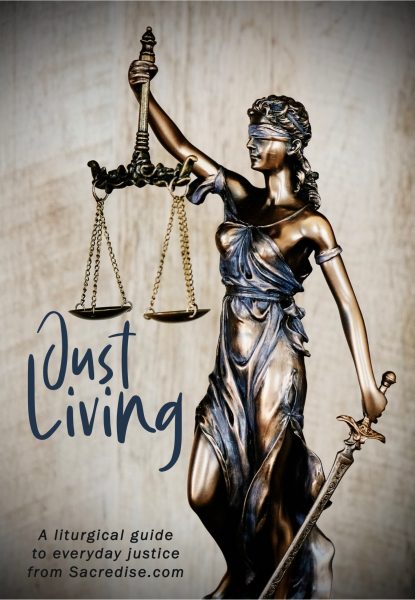 Just Living – A Liturgical Guide to Everyday Justice
Just Living – A Liturgical Guide to Everyday Justice
 The twelve meditations in this beautiful full-color book are designed to provide moments of refreshment throughout the day or week. The blending together of prayers, reflections, questions, and photos invites us to pause, reset and refresh ourselves. Rest is such an important part of the rhythm of our lives, not just a weekly rest of Sabbath, but pauses of rest throughout the day to reset our focus and renew our connections to God. Enjoy as a PDF download, or purchase the hard copy here.
The twelve meditations in this beautiful full-color book are designed to provide moments of refreshment throughout the day or week. The blending together of prayers, reflections, questions, and photos invites us to pause, reset and refresh ourselves. Rest is such an important part of the rhythm of our lives, not just a weekly rest of Sabbath, but pauses of rest throughout the day to reset our focus and renew our connections to God. Enjoy as a PDF download, or purchase the hard copy here.
As an Amazon Associate, I receive a small amount for purchases made through appropriate links.
Thank you for supporting Godspace in this way.
When referencing or quoting Godspace Light, please be sure to include the Author (Christine Sine unless otherwise noted), the Title of the article or resource, the Source link where appropriate, and ©Godspacelight.com. Thank you!

